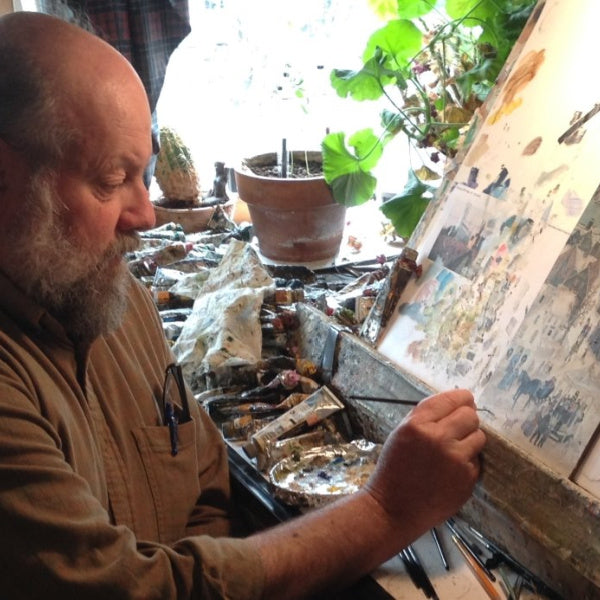While the tradition of following in a parent’s footsteps and apprenticing to their trade has largely passed, there are notable exceptions in the world of art and letters, including the Moses family. Will Moses was raised in the Upstate New York hamlet of Eagle Bridge, and has, since childhood, been an active creator, the fourth generation in a line of artists founded by the famous folk artist, Grandma Moses.
He works in the same 200-year-old farmhouse where Grandma Moses launched her career, and Moses’ work — like hers — reflects the whimsy, delight, and beauty found in quiet moments at home, at work, and at play. His books, paintings, and other exhibitions have been shown across the country and in Canada and Japan, and have a home in several museums and collections, including the Smithsonian Institution, the White House, and the Presidents Ford and Reagan Libraries.
As we shelter cozily at home, we have been irresistibly drawn to Moses’ folkstyle depictions of early New York State life, especially those he has turned into puzzles. We sat down with him to find out more about his inspiration and vision, much of which stems from his unconventional upbringing. Please read on for his insights.
NEW YORK MAKERS: I would love to hear a bit about your childhood. You grew up in a family of artists. Did you feel pressure to be an artist or did it feel like a calling?
WILL MOSES: Childhood seemed fairly normal at the time, but looking back on it from a modern perspective it was a bit of a free-range upbringing. Oversight was not a big part of parenting at the time, and I took full advantage of that with lots of time in the woods, fishing, swimming, building camps, and driving old cars through the fields. We had a fair amount of land, woods, and fields open to us, and, for children with imaginations, there was always plenty to get up to. On the other hand, my Grandfather was never happy unless he had all the kids working on the farm, and he was really good at getting us to do that. To be honest, working on the farm and playing in the sand pile in the backyard with toy trucks, tractors, and bulldozers is where I think I learned the most about life, work, and creative thinking. Today, of course, many people would be appalled by this approach to child rearing, but the truth is we all learned a lot from it, including responsibility and how to take care of ourselves. We all survived and turned out O.K. The older kids looked after the younger kids, and, on the farm, you naturally learned a lot about life and people. My advice to any parent is: give your kid a pile of dirt and a few good digging tools and let them figure it out. No, I never felt pressured to paint. It might have been a calling, but not too sure about that either. It was simply something I could do and like to do, and I wanted to see where I could go with it.


NYM: Did you ever receive "formal" training, and what are your thoughts on the pros and cons of being a "trained" artist?
WM: No, I never had any formal training. My grandfather painted, but usually only in the winter, when the farm work slowed down. Once again, just as he encouraged me to get to work at a young age, he also encouraged me and all of my contemporaries to paint. He always had paints and painting boards for us to use and even made a special smaller painting table for the little kids to use. He was very proud of the tradition that Grandma Moses established, and he was determined that all of his grandchildren paint at least one painting with him, and I believe they all did. His paint studio was just a short walk from our house, so it became a natural hangout for me and I got to spend quite a bit of time with him. He was always helpful and incredibly patient in his coaching. I am not really sure how to respond to the pros and cons of being a trained artist. I have always viewed it like this: I had a set of tools given to me, and my job is to go out in the world and make a living with the tools I have, not the ones I wish I might have had.
NYM: You have produced an incredible volume of work. Can you share the number of paintings, drawings, books (and anything else) that you've created?
WM: It is a bit hard to say for sure, but I have been doing this for quite a while, and so the number of paintings is certainly adding up, and then each book has a fair number of paintings, and I guess at this point, I have done 12 or 13 books. So yes, I manage to keep busy.
NYM: What regions and towns in New York most inspire you to paint now?
WM: For most of my paintings it is simply looking out the window and using imagination. The area we live in is very beautiful and has quite a rich history from the time of the Indians and the first Dutch and French settlers who explored this area. Washington County and northern Rensselaer County are largely composed of the rolling Taconic mountain range. To the east, we have the Green Mountains of Vermont and to the north, the Adirondack Mountains. It is a nice area.
NYM: We love your books, and many are based in New York. Did you go out and take photographs, sketch out scenes in person, or do you work from memory?
WM: Research and imagination. I think each painting should be able to tell a story in itself. The story it tells one person may not be the story it tells another person, but my goal is anyone should be able to look at the painting and be able to tell a story based on what they see.

"Snowy Sunset" by Will Moses
NYM: What is your favorite New York book or artwork not created by a member of your family?
WM: That is a hard question. I have always admired the paintings of the Hudson Valley painters, not one more than another though, and James Fennimore Cooper, Washington Irving, and Richard Russo. I think in large measure, because their stories are traceable to our area of the world.
NYM: Tell me about your gallery and publishing house, Mt. Nebo. Has it evolved in a way that surprised you and your wife Sharon?
WM: Mt. Nebo is the name of the old farm where we live. It is the house Grandma Moses and her husband lived in for a large part of their lives and is where my ancestors grew up. “Mt. Nebo” is where Moses from the Old Testament glimpsed the promised land just before he died, and Grandma always referred to this property as Mt. Nebo, possibly as a result of her native ironic Scotch humor. So, when we moved here, the property was already named, and we simply revived it. Is this all a surprise to us? Certainly. What we do is not supposed to work in terms of a business — and sometimes it doesn’t — but, nevertheless, we are still here and still keeping our heads above water. It can be difficult to juggle business, creative thinking, art, family, and world distractions all under one roof; but, then again, it is sometimes like being in a lifeboat in that you at least know where the sharks are and you know if you want to get anywhere, you need to paddle.

NYM: Whose idea was it to create Mt. Nebo?
WM: I think it was mine. I had an idea for a life plan and this was it. Ignorance is a happy starting place and being bullheaded is an attribute as well.
NYM: It's the winter in New York. Not an easy time, especially with quarantine in place. How do you stay positive and creative?
WM: Well, it is not getting any easier. I never minded the winters and love to have a good snowy winter. I know it makes me a minority. The Covid-19 thing is taking a toll on people, however, and that is hard to watch. We have been fortunate in that we can get out and walk in the woods and work in the yard and have jobs that don’t put us in contact with tons of people. I am also a paramedic and volunteer my time at the local EMS agency, so I see the people infected with Covid; but, honestly, the worst problems are the social problems brought on by the isolation imposed by fear of the disease — the loneliness, lack of contact with family and friends, depression, stress, overdoses, and suicide. There is no rose to put on this package. It is hard for everyone, and, if you aren’t a little discouraged from time to time, you probably are not listening to the news. I try to stay positive through keeping a routine and getting outside to work and looking forward to different seasonal aspects, such as sugaring and gardening. Business is certainly different and likely to remain so, but still we keep paddling the boat because we know if we want to get to shore we must.
We’re all paddling a little harder than usual, but finding quiet moments of contented contemplation are much easier with talents like Will Moses.


Leave a comment